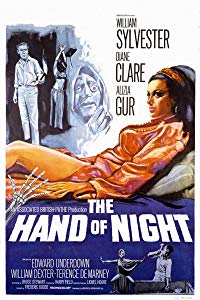
A poker in the hands of a widow. Two of NATO’s atomic bombs are hijacked by the criminal organisation SPECTRE, which holds the world to ransom for £100 million in diamonds, in exchange for not destroying an unspecified city in either the United Kingdom or the United States (later revealed to be Miami). The search leads James Bond (Sean Connery) to the Bahamas, where he encounters Emilio Largo (Adolfo Celi) the card-playing, eye patch-wearing SPECTRE Number Two whom he bests at the tables. Backed by CIA agent Felix Leiter (Rik Van Nutter) and Largo’s mistress Domino Derval (Claudine Auger) Bond’s search culminates in an underwater battle with Largo’s henchmen but time is running out … What strange eyes you’ve got. The one that caused the franchise a whole lot of legal issues in the ensuing years, this was also the one the audiences went bonkers for with Widescreen shooting, seriously glossy production values and slick underwater sequences that take up about a quarter of the overall running time which at two hours ten minutes was by far the longest in the series thus far. The legal issues arose because Ian Fleming’s 1961 novel was based on a story by producer Kevin McClory and was intended as the first in the series with a screenplay by them with Jack Whittingham. The new screenplay is by Richard Maibaum and John Hopkins and it commences with an ingenious escape from a surprising funeral. The cat and mouse relationship between Bond and Largo is consistently surprising and satisfying; Celi is particularly good in the role. The production design by Ken Adam is quite breathtaking, the women are among the most beautiful of the era – Auger (Miss France, voiced by Nikki van der Zyl), Luciana Paluzzi as femme fatale Fiona Volpe, Martine Beswick as Paula Caplan, Bond’s tragic CIA ally, Molly Peters as physiotherapist Patricia Fearing – and Bond is actually saved by a woman. The gadgets include water-firing cannon affixed to the rear of the Aston Martin, a jetpack and a handbag-friendly Geiger counter. It all looks glorious and the incredible underwater work is shot by Ricou Browning although it’s not always clear what’s going on. The theme song by composer John Barry (returning to the franchise) with lyrics by Don Black is performed by Tom Jones who fainted in the recording booth as he sang the final note. What’s not to like? Directed by Terence Young in his third and final Bond outing. Remade 18 years later as Never Say Never Again, with Connery once more taking the lead in what was his final Bond film. Was ever a man more misunderstood?





























































































































































































































































































































